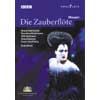Mozart (Die) Zauberflöte
McVicar’s new production provides food for much thought and more musical pleasure
View record and artist detailsRecord and Artist Details
Composer or Director: Wolfgang Amadeus Mozart
Genre:
DVD
Label: Opus Arte
Magazine Review Date: 11/2003
Media Format: Digital Versatile Disc
Media Runtime: 485
Mastering:
Stereo
Catalogue Number: OA0885D

Tracks:
| Composition | Artist Credit |
|---|---|
| (Die) Zauberflöte, '(The) Magic Flute' |
Wolfgang Amadeus Mozart, Composer
Adrian Thompson, Monostatos, Tenor Alan Oke, First Armed Man, Tenor Christine Rice, Second Lady, Soprano Colin Davis, Conductor Diana Damrau, Queen of Night, Soprano Dorothea Röschmann, Pamina, Soprano Franz-Josef Selig, Sarastro, Bass Gillian Webster, First Lady, Soprano Graeme Broadbent, Second Armed Man, Bass John Holland-Avery, Third Boy, Mezzo soprano Kathleen Tynan, Papagena, Soprano Matthew Beale, First Priest, Bass Richard Van Allan, Second Priest, Tenor Royal Opera House Chorus, Covent Garden Royal Opera House Orchestra, Covent Garden Simon Keenlyside, Papageno, Baritone Thomas Allen, Speaker, Bass Tom Chapman, Second Boy, Soprano Willy Hartmann, Tamino, Tenor Wolfgang Amadeus Mozart, Composer Yvonne Howard, Third Lady, Mezzo soprano Zico Shaker, First Boy, Soprano |
Author: Alan Blyth
This somewhat controversial staging opened earlier this year to a mixed reception. It treats the ever-elusive work very seriously indeed, adopting ideas from many different sources – the Age of Enlightenment, scientific experimentation, pantomime, and the settings of early productions of the work, plus hints of more modern philosophical ideas. Within predominantly dark-hued sets, these conceits work well for the more serious aspects of the equivocal story, but the lighter, fairy-tale portions of the score suffer a little in consequence. For those and for an altogether more natural, easy-going approach on a smaller scale, you should consider as a supplement the enchanting Ludwigsburg staging listed above.
McVicar’s delving approach demands and gets a greater portion of the dialogue than is usually included these days. This adds meaning to many non-musical scenes, most notably the musings of Sarastro and his fellows at the beginning of Act 2. This speech gains greatly from the confidence and character with which it is spoken and speaks volumes about the careful rehearsal of the whole production. By the same token, it is odd to find several familiar phrases excluded.
The singers, all very much at home in their roles, seem to me to have been seriously underrated after the first night. Certainly Keenlyside received his due for his oddball, rather sad Papageno, yet one who is paradoxically lovable for his little-man-lost demeanour and for his warm, faultless singing. Röschmann’s Pamina has vocal beauty, clearly articulated diction and the kind of complete conviction that used to mark Lucia Popp in this role. Hardly less effective, one or two hard notes at the top apart, is Hartmann’s heartfelt and expressive Tamino.
Selig makes as much of Sarastro’s arias and his all-important dialogue as any in my experience. Add to that Allen’s exquisite cameo of a Speaker, a spitfire, convincing Queen of Night from Damrau (current owner of the part around the houses), three sparky Ladies (though they are unflatteringly garbed), Thompson’s preposterous Monostatos, and one is left lamenting only the weakly sung and horribly vulgar Papagena.
Sir Colin Davis presides at his most avuncular. Many, used to fast-and-furious readings, found him dilatory. For me, he lives every moment of the score and conveys all its profound humanity. Praise is also due to Sue Judd’s video direction and for the excellent sound.
McVicar’s delving approach demands and gets a greater portion of the dialogue than is usually included these days. This adds meaning to many non-musical scenes, most notably the musings of Sarastro and his fellows at the beginning of Act 2. This speech gains greatly from the confidence and character with which it is spoken and speaks volumes about the careful rehearsal of the whole production. By the same token, it is odd to find several familiar phrases excluded.
The singers, all very much at home in their roles, seem to me to have been seriously underrated after the first night. Certainly Keenlyside received his due for his oddball, rather sad Papageno, yet one who is paradoxically lovable for his little-man-lost demeanour and for his warm, faultless singing. Röschmann’s Pamina has vocal beauty, clearly articulated diction and the kind of complete conviction that used to mark Lucia Popp in this role. Hardly less effective, one or two hard notes at the top apart, is Hartmann’s heartfelt and expressive Tamino.
Selig makes as much of Sarastro’s arias and his all-important dialogue as any in my experience. Add to that Allen’s exquisite cameo of a Speaker, a spitfire, convincing Queen of Night from Damrau (current owner of the part around the houses), three sparky Ladies (though they are unflatteringly garbed), Thompson’s preposterous Monostatos, and one is left lamenting only the weakly sung and horribly vulgar Papagena.
Sir Colin Davis presides at his most avuncular. Many, used to fast-and-furious readings, found him dilatory. For me, he lives every moment of the score and conveys all its profound humanity. Praise is also due to Sue Judd’s video direction and for the excellent sound.
Discover the world's largest classical music catalogue with Presto Music.

Gramophone Digital Club
- Digital Edition
- Digital Archive
- Reviews Database
- Full website access
From £8.75 / month
Subscribe
Gramophone Full Club
- Print Edition
- Digital Edition
- Digital Archive
- Reviews Database
- Full website access
From £11.00 / month
Subscribe
If you are a library, university or other organisation that would be interested in an institutional subscription to Gramophone please click here for further information.





